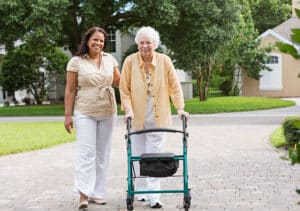
In the symphony of life, the melodies change as the years unfold, and for seniors, this often involves grappling with the complexities of limited mobility. While the golden years bring with them wisdom and experience, they also present physical and emotional hurdles that can significantly impact overall well-being. In this exploration, we will delve into the multifaceted nature of limited mobility among seniors and uncover empowering ways for both seniors and their support networks to overcome these challenges.
Understanding the Impact:
Limited mobility isn’t merely a matter of restricted movement; it casts a shadow over a senior’s physical and emotional well-being. The loss of independence in mobility can trigger a cascade of emotions, including frustration, isolation, and even a sense of loss. It’s crucial to recognize that the effects are not confined to the physical realm; they weave into the emotional fabric of one’s life, influencing mental health and self-esteem.
Physical Well-being:
The intricate dance between physical and emotional health is undeniable. Limited mobility often leads to a sedentary lifestyle, contributing to a decline in muscle mass, joint flexibility, and overall cardiovascular health. This decline can exacerbate existing health conditions, making it imperative to address mobility concerns holistically. Physical well-being becomes a cornerstone for a vibrant and fulfilling life, and tackling limited mobility requires a comprehensive approach.
Emotional Well-being:
The emotional toll of limited mobility can be profound. Seniors may find themselves grappling with feelings of isolation as their ability to engage in social activities becomes restricted. Depression and anxiety can settle in, casting a long shadow over the golden years. Approaching limited mobility not merely as a physical challenge but as a nuanced emotional journey requires empathy, understanding, and unwavering support.
Empowering Seniors:
Adaptation and Acceptance:
The first step towards empowerment involves encouraging seniors to adapt to their changing mobility. Acceptance, in this context, doesn’t imply resignation but is an invitation to explore new avenues and redefine what a fulfilling life looks like. The integration of assistive devices, home modifications, and adaptive technologies can play pivotal roles in facilitating this adaptation.
Engaging Hobbies and Activities:
Limited mobility should not act as a confining force on one’s interests. Seniors can explore a myriad of hobbies and activities that cater to their abilities. Whether it’s discovering the joy of painting, immersing oneself in the world of literature, nurturing a garden, or learning to play a new instrument, finding joy in pursuits that align with their mobility level can provide a renewed sense of purpose and fulfillment.
Staying Socially Connected:
Social isolation is a common consequence of limited mobility, but it need not be an inevitability. Loved ones and caregivers play vital roles in ensuring seniors remain socially connected. Organizing regular family visits, facilitating video calls, and exploring community events tailored to seniors can help combat feelings of loneliness and foster a sense of belonging.
Support Networks:
Open Communication:
Establishing open communication channels between seniors, loved ones, and caregivers is paramount. Seniors should feel comfortable expressing their emotions and needs, fostering a supportive environment that addresses both physical and emotional challenges. Regular check-ins can provide valuable insights into their evolving needs, allowing for timely adjustments and interventions.
Collaborative Care Planning:
Whether the issue is knee joint pain or diabetic neuropathy, developing a collaborative care plan involving healthcare professionals, family members, and the seniors themselves is instrumental in addressing mobility challenges comprehensively. This may include physical therapy to enhance mobility, nutritional guidance to support overall health, and mental health support to address emotional well-being, all tailored to the individual’s unique needs.
Encouraging Independence:
While providing support is crucial, preserving a sense of independence is equally important. Empowering seniors to make decisions about their daily lives, participate in activities they enjoy, and contribute to decision-making processes not only boosts their self-esteem but also fosters a sense of control over their circumstances.
Limited mobility in the golden years is a formidable challenge, but it is not insurmountable. By understanding the intricate relationship between physical and emotional well-being and by adopting adaptive strategies, seniors and their support networks can navigate these challenges with resilience and grace. Embracing change, fostering open communication, and promoting independence can transform the narrative, turning limited mobility into an opportunity for growth, connection, and a fulfilling life. It is a collective journey, where each step forward is a triumph over adversity and an affirmation of the enduring spirit within.